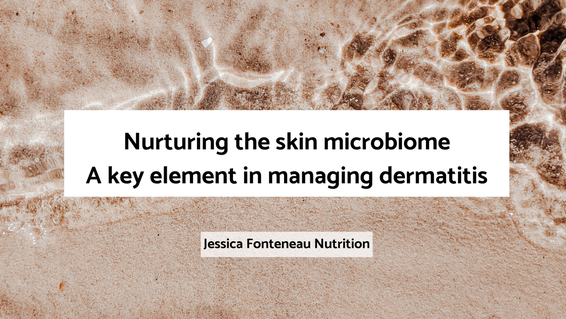ARTICLE Categories
All
|
|
In my 10 years in clinic, specialising in skin health, I’ve seen first-hand the profound impact diet and lifestyle choices have on skin health. One area that is increasingly grabbing attention is the skin microbiome and its role in conditions like dermatitis/eczema.
In this article I’ll explore what the skin microbiome is, its connection to dermatitis and how paying it some attention can be a crucial step in managing this challenging condition. The skin microbiome: Our body’s first line of defence. You’ve probably heard of the gut microbiome, the population of microorganisms, including bacteria, fungi and viruses that live in our gut, but you may not have heard of the skin microbiome. The skin microbiome has a similar community of microorganisms that live on our skin and this complex ecosystem is vital in the protection of our skin from harmful pathogens, inflammation regulation and overall skin health. The skin microbiome is not only part of the skin barrier that stops unwelcome organisms from entering the blood stream, but it also acts as a crucial go-between from the outermost skin layer and the immune system. It is crucial that a balance of microorganisms be maintained to support the health of any organ that has a microbiome, including skin and gut. When an imbalance occurs in the skin microbiome, skin conditions such as eczema can emerge or worsen. Eczema and Microbiome Balance Eczema, also known as dermatitis, is characterised by dry, itchy, and inflamed skin. Research has shown that individuals with eczema often have an altered or unbalanced skin microbiome. (1,2). Eczema patients frequently have an increase in the Staphylococcus aureus bacteria which plays a role both in inflammation and possible infection. This imbalance can disrupt the skin’s barrier function, making it more susceptible to irritants and allergens, further worsening eczema symptoms. Nurturing the Skin Microbiome The good news is that we can nurture our skin microbiome, just as we can support our gut bacteria population. Here are some tips to get you started:
1. Barbarot S, Aubert H. Physiopathologie de la dermatite atopique. Ann Dermatol Venereol. 2017;144:S14–20. 2. Nakatsuji T, Gallo RL. The role of the skin microbiome in atopic dermatitis. Ann Allergy, Asthma Immunol [Internet]. 2019;122(3):263–9. Available from: https://doi.org/10.1016/j.anai.2018.12.003 Sign up for my news to receive the published articles straight to your inbox. Read more by clicking below to see my previously published articles:
I’m Jessica Fonteneau, the Eczema and Digestive Health Nutrition Expert. I’ve worked with hundreds of clients to help them change their diets, better manage their flares, and find relief. My vocation is to help those with eczema and digestive issues, because I have suffered with these interlinked conditions since I was 6 months old, and I truly know what it is like to experience these debilitating conditions. Every client I have ever worked with has their own triggers and ideal nutrition. There is no such thing as ‘one-size-fits-all’. Whether you work with me one-to-one or use my guided tools, my objective is to help you uncover what works best for you, so that you take back control and experience relief. My guided programmes are only suitable for adults as children have very specific nutrition requirements. I do, however, work with many child clients as part of my clinic. I also offer two free communities for adults caring for children with eczema and digestive symptoms, feel free to come and join us and get some well-deserved support.
To easily keep up with my articles, masterclasses, ebooks and online programmes and receive exclusive access to early bird offers, sign-up to my newsletter. Interested in what I do and who I am? Go to my website: www.jessicafonteneaunutrition.com
0 Comments
Leave a Reply. |
AuthorI’m Jessica Fonteneau, I’m the eczema specialist and I help people Escape from the Eczema trap. Archives
April 2024
Catégories
All
|


 RSS Feed
RSS Feed